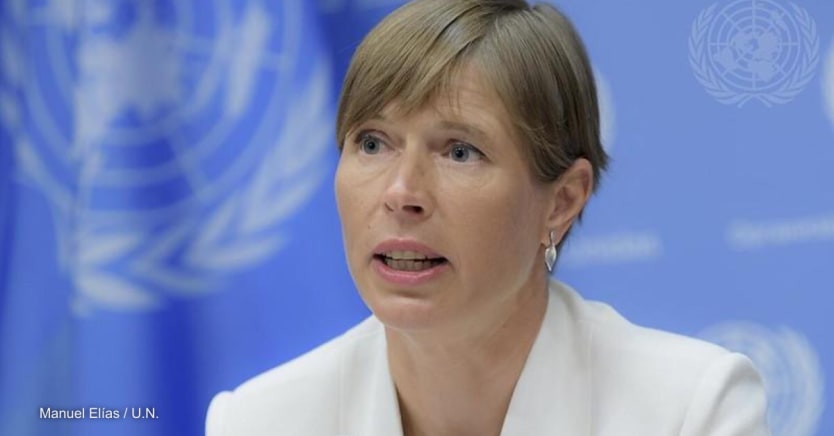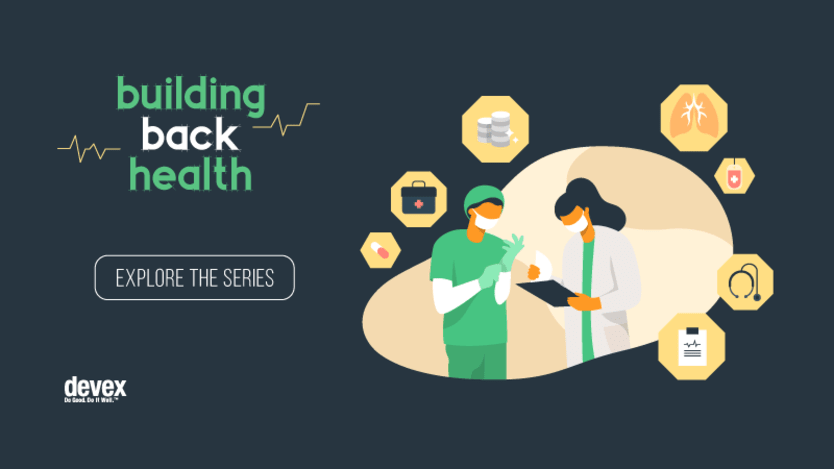
Ensuring every newborn child is registered is the number one priority for Estonian President Kersti Kaljulaid as she takes on the new role of global advocate for Every Woman Every Child, an initiative aiming to end all preventable maternal, newborn, and child deaths by 2030, as well as improve the health and wellbeing of women, children, and adolescents worldwide.
Kaljulaid — formerly co-chair of the High-Level Steering Group for the initiative — was appointed to the first-of-its-kind position by United Nations Secretary-General António Guterres in June.
“I hope to make neglecting children and women's issues more uncomfortable,” Kaljulaid told Devex, adding that she suspects her inability to be diplomatic on these issues is why she was selected.
According to UNICEF, around a quarter of children under the age of five have not had their births recorded despite it being a human right. No registration means no birth certificate to prove age, which can put children at higher risk of being forced into work, early marriage, or statelessness.
“When things really collapse, we have to rely on those who are able to talk to and negotiate at least the bare minimum.”
— Kersti Kaljulaid, global advocate, Every Woman Every ChildKaljulaid’s solution is to start from the viewpoint that technology can be used “to do things better.” “What is easier than to make sure that every mother can register online using a mobile phone, if nothing better is available, and let the National Population Registry know that the child is born?” Kaljulaid asked.
Speaking to Devex, Kaljulaid explained why birth registration is her top priority and how this new role will help push the agenda forward in line with the Sustainable Development Goals.
This conversation has been edited for length and clarity.
What difference do you think having a global advocate will make to the Every Woman Every Child agenda?
I've already said to H6 and other organizations, if you see a concrete way of how I could help — be it coming with you to help gather and raise funds, pinpoint a particular crisis, go on the spot together with cameras, follow the situation, demonstrate to the world how bad things really are — I'm ready to do so, I'm ready to consider it.
We do work [through] all the procedures which we have but I'm ready to do not [the] so common steps, go out of my way forgetting all kinds of institutional frameworks and … say "hey the world, look we need to resolve this."
What are your key priorities going into the role?
It's obvious that the biggest problems are nutrition [and] maternal mortality … They’re linked as well because proper nutrition during pregnancy helps safe delivery and the safe childhood of a child.
My solution, maybe because I'm Estonian, is also to start from the viewpoint that we can use technology more to do things better. I've set an interesting, very low objective, first and foremost, to make sure that every child who is born globally is registered because how can you offer nutritional help, how can you work with children, teenagers, [and] women, if you don't know who is born to whom when?
If we set our mind on that … we'll join these dots, which are already on the map and create a system where no birth goes unnoticed. Then we can already start to analyze this data to make sure that we deliver nutrition help where this is needed. And we can also start to work better through the data [on what] is causing maternal deaths … We need to have a breakdown of these reasons and causes country by country so that we could also direct our help in the most efficient way.
When you're thinking of Afghanistan or perhaps another country affected by conflict, how do you plan on rolling out an initiative such as registering all births?
First and foremost, there are lower hanging fruits where authorities are ready to cooperate with the international diaspora in order to achieve this objective. We have a stack of organizations who are able to work with regions in conflict, regions exiting from the conflict, regions which are governed by oppressive regimes … When things really collapse, we have to rely on those who are able to talk to and negotiate at least the bare minimum … We should set lower ambitions there, but we should not leave them behind.
Where does this agenda in improving the circumstances for women and girls fit into this idea of building back from the pandemic?
Lancet launches third series on child and maternal malnutrition
The third set of papers in a series of research examining the state of nutrition for young children and women outlines the steps to reach scale.
We [make] decisions [without] paying enough attention to women and children’s issues. We have seen during this pandemic a lot of elements which do not allow us to quantify how bad the situation really is, but we know that women have not been able, or have been afraid, to go to the doctor. People who normally go and discover and disclose, for example, the situation of children in conflict, etc. have found it even more difficult to move around and to pinpoint the issues. Delivery of food, help, everything has been hindered by this pandemic.
In addition, normal vaccination for other diseases may also have suffered because all the elements you need for creating vaccines and delivering and distributing them have been harnessed to fight the pandemic. We’ve not been able to quantify, but all the H6 organizations with their data have said that they have the science which shows that things will look worse once we get statistics this year.
We want these statistics to be a tool box and a data set which every decision maker globally — be it at the U.N. level or national level — keeps in mind. It has to be simple enough for them to understand. If it's simple enough, clear enough, it's difficult to ignore. That's the plan.
You mentioned technology. How much of a key component is that in the agenda and this idea of building back from COVID-19?
The lowest hanging fruit is to make sure that every child is registered globally in this world, but also in breaking down this maternal mortality information, for example, country by country, to pinpoint where we need to work with. This cannot happen without big data and handling of the big data. So we need to make sure that the data flow is there, our capability to analyze the data is there, but at the same time, that the privacy is protected.
It's very important that we do keep this in mind; that governments can only handle big data concerning their own people if they promise the people that they will not misuse this data … Because we are a European country, we apply General Data Protection Regulation, but we run all our public services online. Maybe we can also help to fast forward the thinking that using data does not necessarily harm people's personal rights.
Visit the Building Back Health series for more coverage on how we can build back health systems that are more effective, equitable, and preventive. You can join the conversation using the hashtag #BuildingBackBetter.









